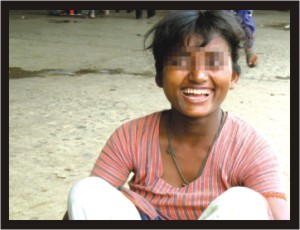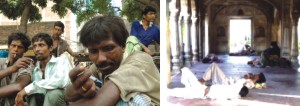|
Health

 |
Many commercial sex workers do not realise how much danger they are in of contracting HIV/AIDS. |
For all the informative workshops on HIV/AIDS, the pamphlets about prevention and the sing-song commercials discouraging ignorance it is unfortunate that the majority of Bangladesh's population remains in the dark when it comes to knowing the proper facts about HIV/AIDS. In reality the slogans of 'bachte hole, jante hobe,' and swanky men in movie theatres talking about having protected sex are a far cry from making the general population knowledgeable enough to be able to successfully combat this deadly disease. Although the terms HIV and AIDS usually come hand in hand, it is important to note that the two are not exactly the same. HIV or human immunodeficiency virus is a retrovirus that causes AIDS (acquired immune deficiency syndrome), which is basically a disease where the body's immune system completely shuts down, thereby making it fully susceptible and vulnerable to any kind of illness. People do not die of AIDS, they die of other ailments -- however harmless they may be to a person with a normally functioning immune system -- such as pneumonia, infections or even something as simple as the common cold, because their bodies are unable to fight these ailments.
HIV can be transferred from person to person through the exchange of bodily fluids -- blood, semen, vaginal fluid and breast milk. The main ways of transmitting the disease are through sexual intercourse, sharing intravenous needles, blood transfusions, breast milk and the transmission of the disease from an infected mother to her baby.
Bangladesh is a country where, according to The World Bank website country profile on AIDS, only about 17% of the most at risk population has a proper knowledge on the dangers of HIV/AIDS, the at-risk populations being commercial sex workers, men who have sex with men (MSM) and intravenous drug users. According to the UNAIDS estimate, at the end of 2002, there were 13,000 cases of HIV/AIDS out of Bangladesh's staggeringly growing population of 136 million. However, since 1989, when the first case of HIV/AIDS was discovered, to 2004, only about 465 cases have been reported.
Since then various NGO's, developmental organisations and the government of Bangladesh have taken many steps to work towards an HIV/AIDS-free future. The Directorate of Health Services and the Ministry of Health and Family Welfare in Bangladesh made a policy on HIV/AIDS, also forming a National AIDS Committee (NAC) working along a National AIDS/STD Program (NASP), which has set guidelines on different things such as testing, blood safety and prevention. In addition, in 2004 a six-year National Strategic Plan was introduced, further strengthening the country's resolve to successfully fight the battle against HIV/AIDS. These organisations and their policies and strategies are responsible for disseminating information on HIV/AIDS not only to those in the high-risk sectors but also those who do not consider themselves to be at risk.
 |
One of the highest risk sectors of Bangladesh is the IDUs, or intravenous drug users who often share contaminated needles. |
The fact is that whether we fall into any of the high risk groups or not, we are all in danger of contracting HIV/AIDS. It cannot be contracted through holding hands, kissing or sharing toilet seats or food. HIV/AIDS is neither airborne nor is it transferable through saliva or urine. However, very rarely it can also get transmitted through open cuts -- meaning a person who has an open cut can transfer the disease to someone else who has an open cut through contact. There was a case in the United States a few years ago where a patient unfortunately contracted HIV from her dentist, which although more of a freak example, is very possible. In addition, most men should avoid getting shaved at their barbers, unless they are sure that the barber uses disposable razors -- the same goes for injections at hospitals, if the needles are not disposable chances are that this is not the best place to get your treatment. Remember, it is better to be safe than sorry.
This is not to bring about panic but to stress the point that someone who is HIV positive or has AIDS does not necessarily have to be a prostitute or 'man who has sex with men' or a drug user. It is so easy to distinguish ourselves from the 'others,' and claim that such a disease is for people who are the so-called dregs of society. This is a misconception that is found not only in Bangladesh, but all over the world. In fact, in the early- to mid-80s when HIV/AIDS was first discovered in the west, the general public was under the impression that it was a disease only contracted by homosexual men. It was only later that it became common knowledge that HIV/AIDS is something that affects everyone around us. After all, an unknowing mother can transfer the disease to her child, and the child is unfortunately stuck with the stigma of being HIV-positive before he or she even gets a chance to start their lives.
Another problem is the taboo on premarital sex that the general Bangali public has. Unfortunately, whether we like to admit it or not, young people are sexually active and sometimes even sexually promiscuous. The fact that they are constantly in fear of discovery causes them to become careless and have unprotected sex which is the main cause of STDs (sexually transmitted diseases) such as syphilis and herpes, not to mention HIV/AIDS.
In addition, Bangladesh's high population of intravenous drug users (IDUs) is also a cause for alarm, since none of them know any better -- especially considering the frame of mind that they are in.
Despite all the steps being taken to prevent HIV/AIDS both on a global and national level, the truth is that not many people understand what this disease is, even those who claim to be educated and who think they know better. And although NGOs and other organisations are doing all they can to impress the seriousness of the problem on their target groups, it is also important to remember that this is not a disease that 'can never happen to you.' The best thing to do is to remain vigilant and careful, knowing the facts and living accordingly.
The Star Desk
Copyright
(R) thedailystar.net 2007
|
